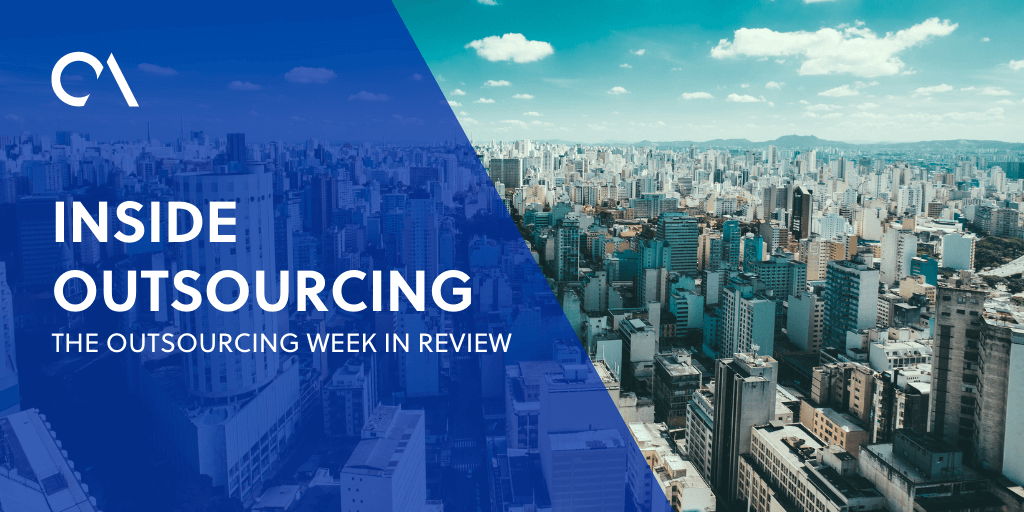Welcome to Inside Outsourcing: The Outsourcing Week in Review
THE WEEK IN REVIEW
The weakening Philippine peso will bolster the country’s Business Process Outsourcing (BPO) industry, said Moody’s Investor Service Sovereign Risk Group Senior Vice President Christian De Guzman. In an interview with ANC, De Guzman explained that BPO services will look “much more attractive” to foreign investors in terms of pricing. Remittances are also poised to benefit from the higher value of the dollar compared to the local currency. However, the analyst warned that the rising foreign exchange could worsen inflation in the country. As of writing, the exchange rate of a dollar to peso is at P54.98, the highest recorded 17 years.
At the same time, Information Technology and Business Process Management (IT-BPM) leaders and stakeholders are urging the incoming Marcos administration to continue supporting the development and promotion of the sector. BPO Partylist President and Performance360 Global Services Director Michael Cubos said that the Department of Information and Communication Technology (DICT) “must spearhead” the industry promotion and strengthen the laws to attract more foreign and local outsourcing investors. Cubos also suggested giving importance to work flexibility for BPO employees. Despite the pandemic, the IT-BPM industry contributed a whopping $29.5 billion to the economy and registered around 120,000 new jobs in 2021. Speaking of work flexibility, the Fiscal Incentives Review Board (FIRB) finally gave its support to the 70:30 hybrid work model. According to Philippine Economic Zone Authority (PEZA) Director-General Charito Plaza, FIRB co-chair Ramon Lopez mentioned his approval of the arrangement during a meeting with the IT Business Process Association of the Philippines (IBPAP). Plaza added that they are only waiting for the FIRB to release a statement on June 29, a day before the start of the new administration. With this approval, the PEZA chief expressed her optimism that this would bring finality to the debate on the controversial hybrid work arrangement in the Philippines.
Albay Representative Joey Salceda offers another alternative to this continuing dilemma — moving BPOs’ membership from PEZA to the Board of Investments (BOI). Salceda explained that this move could allow outsourcing firms to conduct alternative working arrangements — such as work-from-home (WFH) — without tax consequences. The government official added that he is willing to work alongside the Department of Finance (DOF) and the Department of Trade and Industry (DTI) in encouraging BPOs to register either as exporters or as BOI-registered domestic enterprises. Meanwhile, the Cebu IT-BPM Organization (CIB.O) will be tackling the hybrid work model and the best type of work setup for the IT-BPM sector in their annual Transformation Summit. The summit’s Chairperson, Darwin John Moises said that hybrid work would most likely be the future of IT-BPO workspaces as employees can still do their tasks efficiently from home. CIB.O Executive Director Buddy Villasis, for his part, added that many BPO firms are willing to lose their tax incentives so that they won’t lose talent. CIB.O’s Transformation Summit will run next month from July 13 to 15, 2022.
In BPO expansions, multinational BPO firm Ubiquity opened its newest office in Cagayan de Oro to meet the needs of its rapidly growing roster of clients. The new site will serve as a “cutting-edge customer service contact center” with its modern telecommunication systems, customer care, and banking operations. Ubiquity CEO Matthew Nyren added that this new center would help expand the firm’s capacity and bring more employment opportunities to Northern Mindanao. Cagayan de Oro is known as the “City of Golden Friendship” and a premium destination for the BPO industry due to its pipeline of young talents and a reputation for friendliness. At the same time, the online jobs startup, OutsourcingStaff.ph, is set to expand its operations as more employers and virtual workers register to the platform. In a press release, OutsourcingStaff.ph said that the uptick in their members is a byproduct of a “dramatic and swift uptake in digital-first working across the globe.” The online marketplace’s founder Clarke Duncan said hiring staff from different countries is the “future of virtual recruitment.” Companies across Europe, the United Kingdom (UK), the United States (US), Canada, Australia, and New Zealand use OutsourcingStaff.ph to find and hire the best virtual workers from the Philippines.
After two long years, the Philippine Offshore Gaming Operator (POGO) industry’s business activity is steadily picking up again. According to property consulting veteran David Leechiu, POGOs are starting to take up long-vacated offices and urban residences despite the surge in COVID-19 Omicron cases earlier this year. From April to May alone, Leechiu Property Consultants reported that POGOs took up 21,000 square meters (sq.m.) of office space. The last time there were new POGO office leasing transactions was in the first quarter of 2020, before hard lockdowns were imposed by the government to curb local COVID-19 transmission.
Several Philippine conglomerates will invest US$20 million to establish the National Center for AI Research (NCAIR). The NCAIR is part of the national program that will accelerate the adoption of AI for industrial development and high-paying jobs for Filipinos. It will also help position the country as an AI Center for Excellence in Southeast Asia (SEA). DTI Secretary Ramon Lopez stated that the private sector is already preparing to register the project with the Securities and Exchange Commission.
Following the memorandum of understanding between PEZA and the Department of Environment and Natural Resources (DENR), at least seven new locations are identified as potential economic zones. PEZA disclosed that these lands are located in the CARAGA Region and are ideal for agro-industrial, agroforestry, mineral processing, and eco-tourism. PEZA Director-General Charito Plaza said that they “aim to restore back the once major industry of wood and put [an] order in the utilization of the raw minerals processed into many other products in Caraga, which has the biggest timber and mining lands.”
New investments mean new tax revenue generators — something the incoming Bureau of Internal Revenue (BIR) Chief Lilia Guillermo is looking forward to. Guillermo said that she plans to digitize tax collection in the Philippines to make tax collection more efficient and less prone to graft and corruption. Recognized as “one of the most powerful women in IT in the Philippines” last 2013, Guillermo recently worked as the Assistant Governor in the Bangko Sentral ng Pilipinas (BSP). Aside from a digitized tax collection system, the incoming BIR chief also promised to collect the Marcos clan’s tax liabilities worth P203 billion (US$3.07 billion) during her term.
All these developments could possibly come to a halt if COVID-19 makes a comeback. Last week, the Department of Health (DOH) detected 32 more cases of the highly transmissible Omicron subvariant BA.5, bringing the total case to 43. According to DOH Undersecretary Maria Rosario Vergeire, out of 32 new cases, 21 were from Region 6 (Western Visayas), four each from Region 4A (Calabarzon) and National Capital Region (NCR), and three from Region 3 (Central Luzon). However, Vergeire said that there is no need for a heightened alert level as there are no still reports of community transmission of this subvariant, and the BA.2.12.1, in the country. To keep people safe and informed, tech giant Google will provide the Philippine government with an additional $1.5 million in a “Search Ad” grant to support its COVID-19 information drive. Given through its philanthropic arm Google.org, the firm aims to help the government surface “important messages online and [deliver] public service announcements” about the virus. Google’s Search Ad grants supported more than 107 million COVID–related public service announcements in the Philippines from March 2020 to January 2022.
Economic think tank IBON Foundation said that the Philippines is among the worst performers in pandemic recovery among countries in the SEA region. In the group’s latest report, the Philippines ranked 8th out of 11 countries in economic recovery based on Gross Domestic Product (GDP) after the outset of the pandemic. The country also recorded the highest inflation rate in SEA and the second-highest unemployment rate in the region. The IBON Foundation stated that the Duterte government lagged behind the performance of other countries in the region due to “mispriorities” during the pandemic. Last March, the think tank also reported that the country is experiencing a “widening inequality gap” due to how the government handled the health crisis.
A “gloomy” post-COVID-19 labor market will welcome 1.6 million fresh college graduates in the Philippines. According to the job website Indeed, the average salary of Filipino freshers is only P16,509 (US$303) per month. For highly skilled new graduates, Trade Union Congress of the Philippines (TUCP) spokesman Alan Tanjusay added that the monthly salary ranges from P20,000 to P25,000 (US$367 to US$459). Tanjusay stated that this salary mismatch promotes the country as a “cheap labor hub” and pushes fresh grads to search for work abroad. To curb the flight of Filipino workers, the Department of Labor and Employment (DOLE) gave a P33 (US$0.61) wage hike to Metro Manila employees and a P55 to P100 (US$1.01 to US$1.84) increase to workers in Western Visayas earlier this month.
Hopefully, they stay home.

Thursday, June 30, 2022
NEWS THIS WEEK
29 June 2022
- BPOs should be shifted to BOI to implement WFH – read article…
- BPOs to benefit from weakening peso — Moody’s analyst – read article…
- PLDT, Smart laud CICC for DFPAL launch – read article…
- PH posts highest number of phishing in SEA — study – read article…
28 June 2022
- Google grants $1.5Mn Search Ad to PH gov’t – read article…
- Incoming BIR chief to digitize tax collection – read article…
- POGOs are slowly re-enter PH – read article…
- Ubiquity opens new PH office – read article…
27 June 2022
- FIRB approves 70:30 hybrid model – read article…
- CIB.O to discuss hybrid set-ups in Transformation Summit – read article…
- PH Conglomerates to invest US$20 Mn for NCAIR – read article..
- PH pandemic recovery lags behind SEA countries — IBON – read article…
24 June 2022
- OutsourchingStaff.ph expands virtual worker recruitment marketplace – read article…
- Bain & Company opens first physical office in PH – read article…
- PEZA, DENR identify 7 potential ecozones – read article…
- IT-BPM execs urge incoming admin to continue supporting industry growth – read article…
23 June 2022
- ‘Gloomy’ labor market to welcome Filipino fresh grads – read article…
- BA.5 subvariant cases in PH rise to 43 – read article…
- Moody’s Analytics hikes Philippine GDP forecast to over 7% – read article…
- Duterte gov’t approves P1.1Tn manufacturing investments – read article…

 Independent
Independent





















